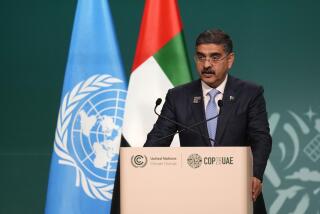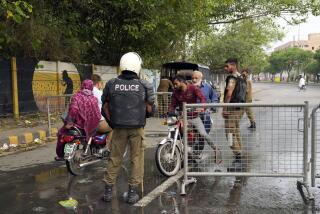Karzai Seeks to Quell Fears
- Share via
KABUL, Afghanistan — With his top security officials charged with murdering a Cabinet minister and his capital’s international peacekeeping force under fire, interim Afghan Prime Minister Hamid Karzai promised Sunday to take “every measure to guarantee security in this battered nation.”
Addressing the international media after three of his most stressful days since he took office Dec. 22, Karzai dismissed the killing of his aviation minister Thursday as a personal vendetta with no political overtones. And responding to reports of gunshots fired at British peacekeepers Saturday and a wild melee Friday involving peacekeepers and soccer fans, he said he might request a bigger and more robust peacekeeping force.
The assassination of Air Transportation and Tourism Minister Abdul Rahman at the Kabul airport fanned fears of a return to the brutal and corrupt Afghan governments of the early 1990s. Saying five suspects had been arrested here and two more in Saudi Arabia, Karzai sought to tamp down concerns that a rogue faction of Northern Alliance officials threatened his government.
“There’s no way we will let Afghanistan go back to the ways of the past,” Karzai said. “These gun-runners, these guys who think they can get away with looting and murder--those days are over.”
But Karzai offered few new details about how four senior security officials and the airport’s two security chiefs were able--at least in the version of events he offered--to kill Rahman and toss his body from an airplane. Three of the suspects then boarded a chartered plane carrying Muslim pilgrims to Mecca, Saudi Arabia. The pilgrims were initially accused of beating Rahman to death because of flight delays.
Nor did Karzai offer details of the purported personal motive for the killing, or why six top officials with a grudge would risk stabbing a government minister to death aboard a plane at an international airport while more than 1,000 people milled about on the tarmac.
Foreign Minister Abdullah added to the mystery by telling reporters at the presidential palace that three of the killers had demanded that Rahman sign a letter of resignation. That led to renewed speculation that the killing involved the lucrative smuggling trade and the opportunities for graft that traditionally have been controlled by aviation ministers.
Karzai said he learned of Rahman’s death when the interior and defense ministers told him that their own security officials were involved. He said he then convened an emergency session of the Cabinet, which decided to have the officials arrested regardless of their senior status.
“They acted like Cabinet members of Afghanistan, not party members--a very patriotic decision,” he said.
Cabinet Is ‘United in Straight Afghan Way’
Denying persistent reports of factional battles within the Cabinet and government, Karzai added, “The Cabinet is very much united in the straight Afghan way.”
He also chastised reporters for focusing on the killing, saying in exasperation, “Look, there were no political motives.”
Those arrested will be “dealt with very strongly,” he said. “There will not be any lenient hand there. . . . They have committed a murder. Let the courts decide.”
Asked what sort of trial the accused can expect in a nation whose justice system is in shambles, Karzai said Afghanistan still functions under a 1964 constitution that provides for criminal trials.
In random interviews in Kabul, ordinary Afghans expressed concern that Rahman’s killing might revive the violence and gunplay that have plagued the capital for years.
“People have gotten really worried since the killing,” said Hurmatullah, 25, a banana vendor who, like many Afghans, uses only one name. “Security is our biggest anxiety. The government is good only as long as security is good.”
Abdul Khaleq, 55, a bus driver, added: “Today this man was killed. Tomorrow another might be killed. We feel endangered for our own lives.”
Even as he was offering assurances that Rahman’s death did not mean a deterioration of security, Karzai said he will ask for a revision of the peacekeeping force’s mandate “if the security environment does not improve further.” He said he wants the “national army”--the fractious collection of warlord militias that toppled the Taliban with U.S. help--to have a greater role once it is trained and mobilized.
Karzai’s comments came a day after a British peacekeeping observation post in Kabul was fired on. A spokesman for the International Security Assistance Force said the peacekeepers returned fire. Villagers said a man helping take his pregnant sister-in-law to a hospital was killed; the ISAF said the incident was under investigation.
Karzai Deflects Queries on Assassination
It was the first attack on an ISAF post since the 4,000-member, 18-nation force began operating in December.
“It isn’t our mandate to intervene within the civilian section of the airport where Rahman was killed,” an ISAF spokesman said Sunday. Capt. Graham Dunlop said that while the ISAF controls only the airport’s military areas, an ISAF fire brigade did rescue the president of the national airline from a mob beating in the civilian zone an hour before Rahman’s death. Dunlop stressed that the ISAF was unaware of the attack on Rahman and received no request to intervene.
At his news conference, Karzai abruptly halted or deflected questions about the slaying. After announcing that police were pursuing two suspects in Afghanistan and another in Saudi Arabia, he urged reporters to shift their attention to his Cabinet’s rebuilding efforts.
The killing, he said, was “a peculiar case, an unexpected one, a very sad one.” When a reporter asked another question about it, the prime minister cut him off and said, “That’s over.”
Also this weekend, internecine fighting flared in Paktia province, southeast of Kabul, as members of several tribes became involved in a dispute over land.
The fight, which took place Saturday about a two-hour drive from the city of Khowst in southern Paktia, occurred when Kochi tribesmen fired on soldiers loyal to the governor of Khowst, who is supported by local warlord Bacha Khan.
The Kochi are seminomadic people who move their cattle and sheep from one area to another along the Afghan-Pakistani border to find fresh fodder. They are known locally as smugglers of guns and hashish.
Khan’s men had gone to the Kochi to try to stop a fight the Kochi were having with soldiers belonging to a rival tribe, according to Kameel Khan, the warlord’s younger brother and a local commander.
Commander Says Tribe Sheltered Al Qaeda
It appeared that the two tribes were fighting over land. But Kameel Khan said the Kochi have sheltered Al Qaeda members and that he and other commanders loyal to his brother had urged the Americans to bomb them.
The bombing could be heard at dusk Saturday, into the night and again at midday Sunday. It was unclear how the local commanders could be sure Al Qaeda members were taking shelter with the Kochi, but one said his men were relying on local intelligence.
According to wire reports citing telephone conversations with residents of the area, the bombing was not on the Kochi people but hit a former Al Qaeda training camp near the Pakistani border.
One resident said that the camp was believed to be deserted and that he did not know of any casualties. The area is about nine miles from the village of Zawar, where U.S. Special Forces troops have been seeking Al Qaeda and Taliban renegades.
Since the sites could not be visited because of ongoing military activity, it was not possible to confirm what the targets were.
The bombing was apparently the first since U.S. jets attacked an Al Qaeda camp in Zawar on Jan. 14.
*
Times staff writer Alissa J. Rubin Gardez, Afghanistan, contributed to this report.
--- UNPUBLISHED NOTE ---
Beginning in stories published in 2006, the Afghan warlord Bacha Khan is identified as Pacha Khan Zadran. (Second reference is “Pacha Khan.”)
--- END NOTE ---
More to Read
Sign up for Essential California
The most important California stories and recommendations in your inbox every morning.
You may occasionally receive promotional content from the Los Angeles Times.














